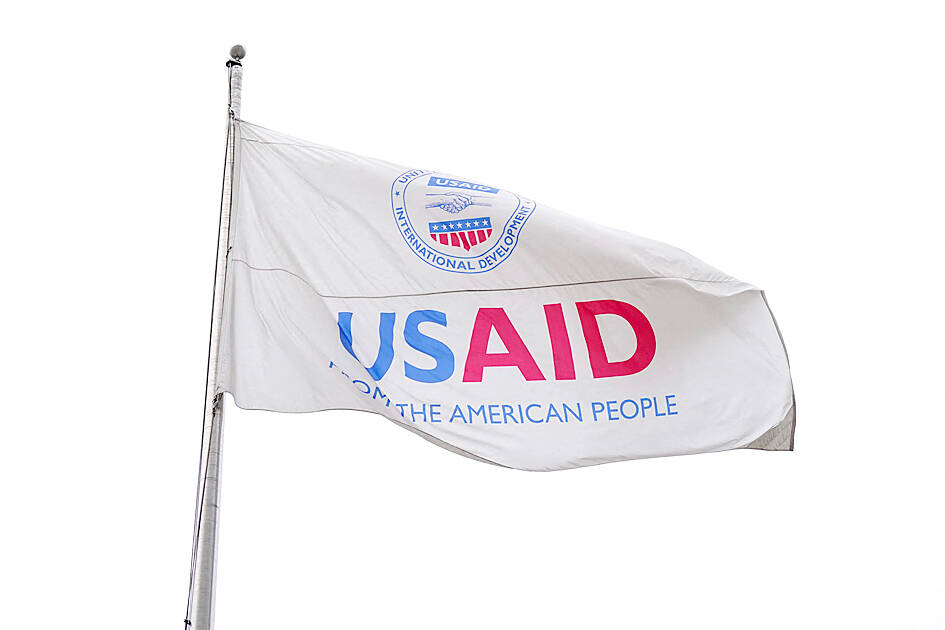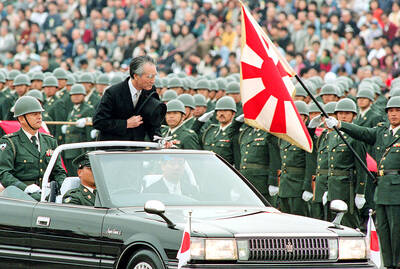Australia is racing to identify the South Pacific’s most pressing funding needs as the US moves to slash its foreign aid budget, Australian Minister for Foreign Affairs Penny Wong (黃英賢) said yesterday.
Crucial food, climate and medical programs in the Pacific islands were left in limbo after US President Donald Trump’s administration announced a 90-day freeze on foreign aid last month.
Wong said Australia had started auditing which Pacific programs were most at risk, with a view to shouldering some of the burden.

Photo: Reuters
However, Wong warned it was “unrealistic” to think Australia — already the Pacific’s largest aid donor — could totally fill the gap left by the US. Senior Ministry for Foreign Affairs official Jamie Isbister said Australia had already started considering how it could step up.
“It is not a one-stop review and done. The situation is fluid and we have to look at how we adapt our programs in response to that,” he told a government hearing yesterday.
The pair’s comments were made just hours before the US confirmed it would slash US$54 billion from overseas development and foreign aid budgets — cutting 92 percent of multi-year contracts. Many aid agencies in the South Pacific have spent weeks bracing for the impact of the anticipated cuts.
Disaster-prone, isolated and threatened by rising seas, tropical Pacific Island states are some of the most aid-reliant nations on Earth, development agencies have said.
The US has for years helped to buy life-saving medicine for tropical disease, combat illegal fishing, and better prepare coastal hamlets for earthquakes and typhoons.
In a foreign policy “snapshot” released yesterday, the Australian government said that Trump’s “America First” agenda would see the US playing a “different role” in the world. China, by contrast, continues to dish out hundreds of millions of dollars in aid, grants and loans targeted at the South Pacific.
In 2022, China spent US$256 million, up nearly 14 percent from three years earlier, while the US spent US$249 million, the Sydney-based Lowy Institute think tank said.
Australia provides the most aid to the Pacific — US$12.9 billion since 2008, the Lowy Institute said.
However, Australia’s foreign policy snapshot warned of turbulent times ahead.
“Authoritarianism is spreading. Some countries are shifting alignment,” Wong wrote in the paper. “Institutions we built are being eroded, and rules we wrote are being challenged.”
“Australians can see a scale of global challenges unprecedented since World War II,” she added.

The Venezuelan government on Monday said that it would close its embassies in Norway and Australia, and open new ones in Burkina Faso and Zimbabwe in a restructuring of its foreign service, after weeks of growing tensions with the US. The closures are part of the “strategic reassignation of resources,” Venezueland President Nicolas Maduro’s government said in a statement, adding that consular services to Venezuelans in Norway and Australia would be provided by diplomatic missions, with details to be shared in the coming days. The Norwegian Ministry of Foreign Affairs said that it had received notice of the embassy closure, but no

A missing fingertip offers a clue to Mako Nishimura’s criminal past as one of Japan’s few female yakuza, but after clawing her way out of the underworld, she now spends her days helping other retired gangsters reintegrate into society. The multibillion-dollar yakuza organized crime network has long ruled over Japan’s drug rings, illicit gambling dens and sex trade. In the past few years, the empire has started to crumble as members have dwindled and laws targeting mafia are tightened. An intensifying police crackdown has shrunk yakuza forces nationwide, with their numbers dipping below 20,000 last year for the first time since records

EXTRADITION FEARS: The legislative changes come five years after a treaty was suspended in response to the territory’s crackdown on democracy advocates Exiled Hong Kong dissidents said they fear UK government plans to restart some extraditions with the territory could put them in greater danger, adding that Hong Kong authorities would use any pretext to pursue them. An amendment to UK extradition laws was passed on Tuesday. It came more than five years after the UK and several other countries suspended extradition treaties with Hong Kong in response to a government crackdown on the democracy movement and its imposition of a National Security Law. The British Home Office said that the suspension of the treaty made all extraditions with Hong Kong impossible “even if

Former Japanese prime minister Tomiichi Murayama, best known for making a statement apologizing over World War II, died yesterday aged 101, officials said. Murayama in 1995 expressed “deep remorse” over the country’s atrocities in Asia. The statement became a benchmark for Tokyo’s subsequent apologies over World War II. “Tomiichi Murayama, the father of Japanese politics, passed away today at 11:28am at a hospital in Oita City at the age of 101,” Social Democratic Party Chairwoman Mizuho Fukushima said. Party Secretary-General Hiroyuki Takano said he had been informed that the former prime minister died of old age. In the landmark statement in August 1995, Murayama said